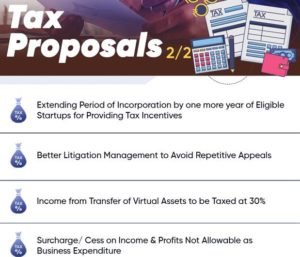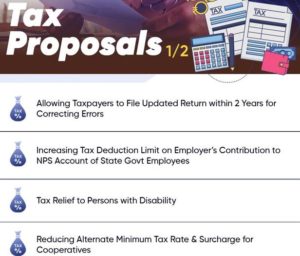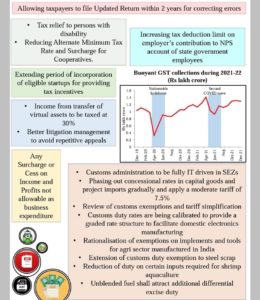India & World UpdatesHappeningsBreaking News
Budget 2022: Increases tax deduction limit on employer’s contribution to NPS account of state govt employees

Feb. 1: The Union Budget 2022-23, while continuing with the declared policy of stable and predictable tax regime, intends to bring more reforms that will take ahead the vision to establish a trustworthy tax regime. Smt Nirmala Sitharaman said that proposals relating to taxes and duties will further simplify the tax system, promote voluntary compliance by taxpayers, and reduce litigation.

 On the Direct Tax side, the budget allows taxpayers to file updated income tax return within 2 years for correcting errors. It also provides tax relief to persons with disability. The budget also reduces Alternate minimum tax rate and surcharge for cooperatives. As an incentive for startups, period of incorporation of eligible startups has been extended by one more year.
On the Direct Tax side, the budget allows taxpayers to file updated income tax return within 2 years for correcting errors. It also provides tax relief to persons with disability. The budget also reduces Alternate minimum tax rate and surcharge for cooperatives. As an incentive for startups, period of incorporation of eligible startups has been extended by one more year.
 The budget proposes to increase tax deduction limit on employer’s contribution to NPS account of state government employees to bring parity with central government employees. Newly incorporated manufacturing entities will be incentivized under concessional tax regime. Income from transfer of virtual assets will be taxed at 30%. The budget proposes better litigation management to avoid repetitive appeals.
The budget proposes to increase tax deduction limit on employer’s contribution to NPS account of state government employees to bring parity with central government employees. Newly incorporated manufacturing entities will be incentivized under concessional tax regime. Income from transfer of virtual assets will be taxed at 30%. The budget proposes better litigation management to avoid repetitive appeals.
 On the Indirect tax side, the Union budget says that Customs administration in Special Economic Zones will be fully IT driven. It provides for phasing out of concessional rates in capital goods and project imports gradually and apply a moderate tariff of 7.5%. The budget underlines review of customs exemptions and tariff simplification, with more than 350 exemptions proposed to be gradually phased out. It proposes that customs duty rates will be calibrated to provide a graded structure to facilitate domestic electronics manufacturing. Rationalization of exemptions on implements and tools for agri sector manufactured in India will be undertaken. Customs duty exemption to steel scrap will be extended. Unblended fuel will attract additional differential excise duty.
On the Indirect tax side, the Union budget says that Customs administration in Special Economic Zones will be fully IT driven. It provides for phasing out of concessional rates in capital goods and project imports gradually and apply a moderate tariff of 7.5%. The budget underlines review of customs exemptions and tariff simplification, with more than 350 exemptions proposed to be gradually phased out. It proposes that customs duty rates will be calibrated to provide a graded structure to facilitate domestic electronics manufacturing. Rationalization of exemptions on implements and tools for agri sector manufactured in India will be undertaken. Customs duty exemption to steel scrap will be extended. Unblended fuel will attract additional differential excise duty.





